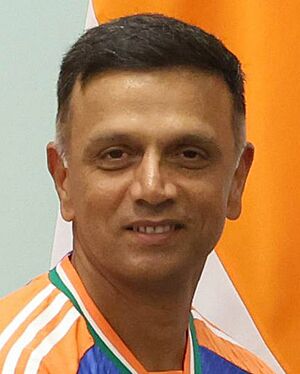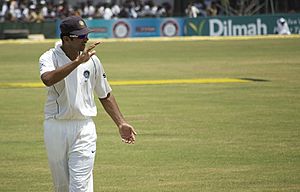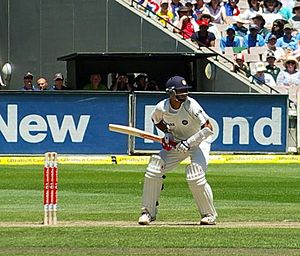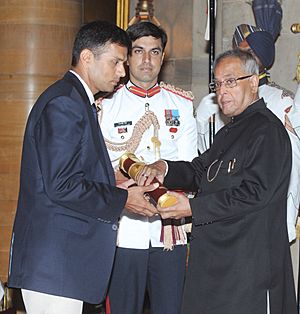Rahul Dravid facts for kids

Dravid in 2024
|
||||||||||||||||||||||||||||||||||||||||||||||||||||||||||||||||||||
| Personal information | ||||||||||||||||||||||||||||||||||||||||||||||||||||||||||||||||||||
|---|---|---|---|---|---|---|---|---|---|---|---|---|---|---|---|---|---|---|---|---|---|---|---|---|---|---|---|---|---|---|---|---|---|---|---|---|---|---|---|---|---|---|---|---|---|---|---|---|---|---|---|---|---|---|---|---|---|---|---|---|---|---|---|---|---|---|---|---|
| Full name |
Rahul Sharad Dravid
|
|||||||||||||||||||||||||||||||||||||||||||||||||||||||||||||||||||
| Born | 11 January 1973 Indore, Madhya Pradesh, India |
|||||||||||||||||||||||||||||||||||||||||||||||||||||||||||||||||||
| Nickname | The Wall, Mr Dependable | |||||||||||||||||||||||||||||||||||||||||||||||||||||||||||||||||||
| Height | 1.80 m (5 ft 11 in) | |||||||||||||||||||||||||||||||||||||||||||||||||||||||||||||||||||
| Batting | Right-handed | |||||||||||||||||||||||||||||||||||||||||||||||||||||||||||||||||||
| Bowling | Right arm off break | |||||||||||||||||||||||||||||||||||||||||||||||||||||||||||||||||||
| Role | Batsman | |||||||||||||||||||||||||||||||||||||||||||||||||||||||||||||||||||
| International information | ||||||||||||||||||||||||||||||||||||||||||||||||||||||||||||||||||||
| National side |
|
|||||||||||||||||||||||||||||||||||||||||||||||||||||||||||||||||||
| Test debut (cap 207) | 20 June 1996 v England | |||||||||||||||||||||||||||||||||||||||||||||||||||||||||||||||||||
| Last Test | 24 January 2012 v Australia | |||||||||||||||||||||||||||||||||||||||||||||||||||||||||||||||||||
| ODI debut (cap 95) | 3 April 1996 v Sri Lanka | |||||||||||||||||||||||||||||||||||||||||||||||||||||||||||||||||||
| Last ODI | 16 September 2011 v England | |||||||||||||||||||||||||||||||||||||||||||||||||||||||||||||||||||
| ODI shirt no. | 19 | |||||||||||||||||||||||||||||||||||||||||||||||||||||||||||||||||||
| Only T20I (cap 38) | 31 August 2011 v England | |||||||||||||||||||||||||||||||||||||||||||||||||||||||||||||||||||
| T20I shirt no. | 19 | |||||||||||||||||||||||||||||||||||||||||||||||||||||||||||||||||||
| Domestic team information | ||||||||||||||||||||||||||||||||||||||||||||||||||||||||||||||||||||
| Years | Team | |||||||||||||||||||||||||||||||||||||||||||||||||||||||||||||||||||
| 1990–2012 | Karnataka | |||||||||||||||||||||||||||||||||||||||||||||||||||||||||||||||||||
| 2000 | Kent | |||||||||||||||||||||||||||||||||||||||||||||||||||||||||||||||||||
| 2003 | Scottish Saltires | |||||||||||||||||||||||||||||||||||||||||||||||||||||||||||||||||||
| 2008–2010 | Royal Challengers Bangalore | |||||||||||||||||||||||||||||||||||||||||||||||||||||||||||||||||||
| 2011–2013 | Rajasthan Royals | |||||||||||||||||||||||||||||||||||||||||||||||||||||||||||||||||||
| Head coaching information | ||||||||||||||||||||||||||||||||||||||||||||||||||||||||||||||||||||
| Years | Team | |||||||||||||||||||||||||||||||||||||||||||||||||||||||||||||||||||
| 2015–2021 | India U-19 | |||||||||||||||||||||||||||||||||||||||||||||||||||||||||||||||||||
| 2015–2021 | India A | |||||||||||||||||||||||||||||||||||||||||||||||||||||||||||||||||||
| 2021–2024 | India | |||||||||||||||||||||||||||||||||||||||||||||||||||||||||||||||||||
| Career statistics | ||||||||||||||||||||||||||||||||||||||||||||||||||||||||||||||||||||
|
||||||||||||||||||||||||||||||||||||||||||||||||||||||||||||||||||||
|
Medal record
|
||||||||||||||||||||||||||||||||||||||||||||||||||||||||||||||||||||
|
Source: ESPNcricinfo, 30 January 2012
|
||||||||||||||||||||||||||||||||||||||||||||||||||||||||||||||||||||
Rahul Dravid (born 11 January 1973) is a famous former cricket player, captain, and coach for the Indian national cricket team. He is known for his amazing batting skills. Dravid scored over 24,000 runs in international cricket. Many people think he is one of the best batsmen in cricket history.
He is often called Mr. Dependable or The Wall because he was so reliable. As a player, he helped India win the 2002 ICC Champions Trophy. Later, as a coach, he led the Indian team to victory in the 2024 ICC Men's T20 World Cup.
Before coaching the main Indian team, Dravid was in charge of cricket at the National Cricket Academy (NCA). He also coached the India Under-19 and India A teams. Under his coaching, the Under-19 team was second in the 2016 Under-19 Cricket World Cup and won the 2018 Under-19 Cricket World Cup. As the senior team coach, India was runner-up in the 2023 Cricket World Cup and the 2023 ICC World Test Championship final.
Dravid was named one of the Wisden Cricketers of the Year in 2000. He also won the Player of the Year and Test Player of the Year awards in 2004. He is the fourth-highest run scorer in Test cricket. He was also the first player to score a century (100 runs) in all ten countries that played Test cricket at the time. He holds records for facing the most balls and spending the longest time batting in Test matches.
Dravid stopped playing One Day International (ODI) and Twenty20 International (T20I) cricket in August 2011. He retired from Test and first-class cricket in 2012. In July 2018, he became the fifth Indian cricketer to join the ICC Hall of Fame.
Contents
Early Life and School
Dravid was born in Indore, Madhya Pradesh, to a Marathi-speaking family. His family later moved to Bangalore, Karnataka, where he grew up. His father, Sharad Dravid, worked for a company that made jams. This is how Rahul got the nickname Jammy. His mother, Pushpa, was an architecture professor. Rahul has a younger brother named Vijay.
Rahul Dravid went to St. Joseph's Boys High School. He earned a degree in commerce from St Joseph's College of Commerce. He was chosen for the India national cricket team while studying for his MBA. He can speak Marathi, Kannada, English, and Hindi very well.
Starting Cricket and Domestic Career
Dravid started playing cricket when he was 12 years old. He played for Karnataka at different age levels (under-15, under-17, and under-19). A former cricketer named Keki Tarapore first saw Dravid's talent at a summer camp. Dravid scored a century for his school team. He also played as a wicket-keeper.
Dravid played his first Ranji Trophy match in February 1991 while still in college. He scored 82 runs in that match. In his first full season (1991–92), he scored two centuries. His good performances helped him get noticed by national team selectors.
International Cricket Journey
First Matches for India
Dravid was first called to the Indian national cricket team in October 1994. However, he did not get to play in those matches. He made his international debut on 3 April 1996 in an ODI against Sri Lanka. He scored only three runs in that game.
His Test debut was much more successful. He was chosen for the Indian team touring England in 1996. He finally played his first Test match at Lord's on 20 June 1996 against England. He scored 95 runs, just missing out on a century in his very first Test innings. He also took his first catch in Test cricket during this match. Dravid had a great debut series, averaging 62.33 runs.
Early Years: 1996–1998
In his early international career, Dravid did very well in Test cricket. However, he found it harder to succeed in One Day Internationals (ODIs). He often struggled to score runs quickly enough in the shorter format.
Dravid scored his first ODI century against Pakistan in 1997. He also started to keep wickets sometimes for India. By the end of 1998, he had played 65 ODIs. People started to call him a "Test specialist" because of his strong Test performances. He then worked hard to improve his ODI batting style.
World Cup Debut in 1999
Dravid made his World Cup debut against South Africa. He scored a half-century in that match. In a crucial game against Kenya, he scored his first World Cup century. He also made a record-breaking partnership of 237 runs with Sachin Tendulkar.
In the next match against Sri Lanka, Dravid scored 145 runs. He made another record-breaking partnership of 318 runs with Sourav Ganguly. This was the first time any pair scored over 300 runs together in an ODI. Dravid became only the second batsman in World Cup history to score two centuries in a row. He finished as the top scorer of the tournament with 461 runs.
After the World Cup, Dravid continued to perform well. He scored 1,761 runs in ODIs in 1999, including 6 centuries. He also took on the role of wicket-keeper more often.
Rising to Prominence
In 2000, Dravid was appointed as the vice-captain of the Indian team. He played a key role in India reaching the finals of the 2000 ICC KnockOut Trophy. He also helped bring John Wright as India's first foreign head coach.
Dravid scored 200 not out in a Test match against Zimbabwe. He also captained India for the first time in an ODI against Zimbabwe, leading them to victory.
Historic Win at Eden Gardens
In 2001, Australia toured India. In the Second Test at Eden Gardens, Australia made India follow-on (bat again immediately) after getting a big lead. Laxman and Dravid then batted together for a very long time. They made a huge partnership of 376 runs. This helped India win the match by 171 runs. It was only the third time in Test history that a team won after following-on.
Dravid scored 81 runs in the next Test, helping India win the series 2–1. He was the top scorer for India in Test matches during the 2000-01 season.
Peak Years: 2002–2006
From 2002 to 2006, Dravid was in top form. He scored 8,914 runs in 174 matches during this period, including 19 centuries. He was the top scorer for India across all formats.
In 2002, during India's tour of England, Dravid scored three centuries in the Test series. He was named joint man of the series. He also played as the designated wicket-keeper in the ODI series, helping India win.
India also shared the 2002 ICC Champions Trophy with Sri Lanka. Dravid contributed with runs and wicket-keeping dismissals. He became the first Indian batsman to score centuries in four Test innings in a row.
2003 Cricket World Cup Performance
Dravid was the main wicket-keeper and batsman for India in the 2003 Cricket World Cup. This allowed India to play an extra specialist batsman. This strategy worked well. India reached the World Cup Finals for the first time since 1983, finishing as runner-up. Dravid scored 318 runs and made 16 dismissals behind the wicket.
Another Eden Gardens Success
In 2003-04, India toured Australia. In the Second Test at Adelaide, Dravid scored an amazing 233 runs. He then scored an unbeaten fifty to help India win the match. This was India's first Test victory in Australia since 1980–81. Dravid was named man of the match and player of the series.
In March 2004, India visited Pakistan for a Test series for the first time in many years. Dravid captained India in the first two Tests. He led India to their first-ever Test victory in Pakistan. In the Third Test, Dravid scored his career-best 270 runs. India won the match and the series.
Leading the Team as Captain
Dravid was chosen as the captain of the Indian team for the 2007 Cricket World Cup.

2011 Tour of England
In 2011, Dravid had a great tour of England. He scored three centuries in the four-match Test series. In the first Test at Lord's, he scored an unbeaten 103 runs. He scored another century in the second Test. In the final match, he carried his bat, scoring an unbeaten 146 runs. He scored 461 runs in the series, averaging 76.83. His performance was highly praised.

Retirement from Playing
Rahul Dravid was dropped from the ODI team in 2009. He was surprisingly recalled for an ODI series in England in 2011. After being selected, he announced that he would retire from ODI cricket after that series. He played his last ODI match on 16 September 2011. His last international match was his debut T20I game, which he played before officially retiring from that format.
Dravid announced his retirement from Test and domestic cricket on 9 March 2012. At the time of his retirement, he was the second-highest run scorer and had taken the most catches in Test cricket.
Coaching Career
After his playing career, Dravid became a mentor for the Rajasthan Royals IPL team in 2014. He also mentored the Indian national team during their tour of England in 2014.
In 2015, he became the head coach of the India U-19 and India A teams. Under his coaching, the U-19 team reached the finals of the 2016 Under-19 Cricket World Cup. Two years later, they won the 2018 Under-19 Cricket World Cup, defeating Australia. Dravid is credited with helping train many future national team players.
In July 2019, Dravid was appointed Head of Cricket at the National Cricket Academy (NCA). He was in charge of all cricket activities there, including mentoring and training players and coaches.
In November 2021, he was appointed as the head coach of the Indian national cricket team. He coached the team to win the 2024 T20 World Cup and the 2023 Asia Cup.
Playing Style and Records
Dravid is famous for his strong batting technique. Early in his career, he was seen as a defensive batsman, best suited for Test cricket. However, he later improved his ODI game, which helped him win the ICC Player of the Year award. His nickname 'The Wall' comes from his solid and dependable batting.
Dravid scored 36 centuries in Test cricket, with an average of 52.31. This includes five double centuries. In ODIs, he averaged 39.16. He is one of the few Indian players whose Test average is better when playing away from home.
Dravid's only Test wicket was Ridley Jacobs in 2002. He often kept wickets for India in ODIs.
Dravid was part of two of the biggest partnerships in ODI history:
- A 318-run partnership with Sourav Ganguly, the first pair to score over 300 runs together.
- A 331-run partnership with Sachin Tendulkar, which was a world record for 15 years.
His highest scores are 153 in ODIs and 270 in Tests. He was named one of the Wisden Cricketers of the Year in 2000. He also scored a very fast fifty (50 runs in 22 balls) against New Zealand in 2003.
In 2004, the Government of India awarded Dravid the Padma Shri. In September 2004, he received the first-ever Player of the Year award and the Test Player of the Year award from the International Cricket Council (ICC).
When he reached 10,000 Test runs, he said it was a proud moment. He felt he had exceeded his own expectations. Dravid is one of only two batsmen to score 10,000 runs at a single batting position. He is the fourth-highest run scorer in Test cricket.
Awards and Recognitions
National Honours
- 1998 – Arjuna Award for achievements in cricket
- 2004 – Padma Shri – India's fourth highest civilian award
- 2013 – Padma Bhushan – India's third highest civilian award
Other Honours
- 1999 – CEAT International Cricketer of the World Cup
- 2000 – Wisden Cricketer of the Year
- 2004 – ICC Cricketer of the Year
- 2004 – ICC Test Player of The Year
- 2004 – MTV Youth Icon of the Year
- 2006 – Captain of the ICC's Test Team
- 2011 – NDTV Indian of the Year's Lifetime Achievement Award
- 2012 – Don Bradman Award
- 2015 – Wisden India's Highest Impact Test Batsman
- 2018 – ICC Hall of Fame
Personal Life
Family
On 4 May 2003, Dravid married Vijeta Pendharkar, who is a surgeon. They have two sons: Samit, born in 2005, and Anvay, born in 2009.
Social Work
Dravid supports the Children's Movement for Civic Awareness (CMCA). He is also a supporter of UNICEF and campaigns for AIDS awareness.
Books About Rahul Dravid
Four books have been written about Rahul Dravid and his cricket career:
- Rahul Dravid – A Biography by Vedam Jaishankar (published in 2004)
- The Nice Guy Who Finished First by Devendra Prabhudesai (published in 2005)
- Rahul Dravid: Timeless Steel, a collection of articles and interviews released by ESPNcricinfo after his retirement.
See also
 In Spanish: Rahul Dravid para niños
In Spanish: Rahul Dravid para niños
 | Chris Smalls |
 | Fred Hampton |
 | Ralph Abernathy |


